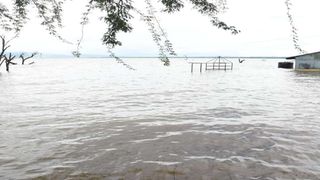
A submerged house at Kampi ya Samaki in Baringo County on May 04, 2020 after Lake Baringo burst its banks.
| Jared Nyataya | Nation Media GroupCounties
Premium
Rift lakes’ fury to cost Sh6trn in remedial measures
What you need to know:
- Wildlife habitats have been destroyed leading to significant loss of livelihoods and change in biodiversity.
There are increased human wildlife conflict occasioned by shrunk habitats and stress both on animals and humans.
If the rising lakes phenomenon continues, the country will have to spend at least Sh6.2 trillion in adaptation and mitigation measures by 2030.
Environment and Forestry Principal Secretary Dr Chris Kiptoo says to build resilience, the country needs at least Sh4.4 trillion over the next three years, and another Sh1.8 trillion for adaptation programmes.
The United Nations Climate Change Conference defines adaptation as crucial actions or plans that a community or household or individual will employ against a current or anticipated impact of climate change whilst and resilience as the ability to recover or bounce back to the original state before the exposure to shock from the effect of climate change.
The current rise has led to submerging of nearly all the riparian land and displacing thousands of people. Infrastructure including roads, settlements, social amenities, grazing land, farmland, fish landing and processing facilities, electricity lines, water supply structures has been affected.
Wildlife habitats have been destroyed leading to significant loss of livelihoods and change in biodiversity. There are increased human wildlife conflict occasioned by shrunk habitats and stress both on animals and humans.
“The situation is a matter of concern to the government and that is why the Cabinet through the advice of the National Security Advisory Committee directed the Ministry of Environment and Forestry to set up a multiagency technical team and monitor the affected water bodies to establish the causes, socioeconomic impact and recommend interventions for cushioning the affected communities,” Dr Kiptoo said.
The findings of the multiagency team have already been tabled in parliament by Environment Cabinet Secretary Keriako Tobiko and are yet been made public, but Dr Kiptoo said the rising lake levels were occasioned by a wide range of conditions, among them the movement of the tectonic plates, climate change and siltation accelerated by land degradation.
Humanitarian crisis
The multiagency team comprised 50 staff from relevant ministries and agencies, counties, the United Nations Development Programme, the USAid, private entities, the Kenya Meteorological Department and the National Land Commission.
To avert a humanitarian crisis, the PS said, the country needs at least Sh2 billion for immediate interventions, including settling affected people, repairing roads, restoring electricity lines, relocating dispensaries and hospitals, repairing and building new schools and building new fences around affected parks.
In the long-term, he said, the government will have to formulate and implement new policies to manage riparian land and catchment areas, increase the forest cover to at least 28 per cent among other measures. The country is in the process of implementing the National Climate Change Action Plan, 2013-2017.
Climate change action in Kenya is guided by the Climate Change Act, which provides a framework for mainstreaming climate change across sectors.
The Act obligates the Cabinet Secretary to formulate a five-year National Climate Change Action Plan that addresses all sectors of the economy and provides mechanisms for mainstreaming climate change into all sectors and the County Integrated Development Plans.
Climate change
The PS said that although the reasons behind the lake levels rise are varied, climate change is largely to blame, as it has led to increased moisture availability, which has led to a high volume of discharge by the rivers feeding the lakes. He also blamed degradation of land and siltation.
“Although Kenya is bearing the brunt, we are not really to blame, as we contribute very little; (about 0.1 per cent) of the greenhouse gas (GHG) emissions,” Dr Kiptoo said, adding that the country is however striving to reduce the emissions further.
The PS noted that there could be legal challenges too as a result of the rising lake water phenomenon, as some of those whose lands have been submerged hold genuine and legal title deeds, and have genuine grievances that would require a government programme to address.
“We may need to compensate those with genuine grievances especially those with genuine title deeds,” he said.
He however pointed out that some of those affected encroached on the riparian lands and would need to be moved.





